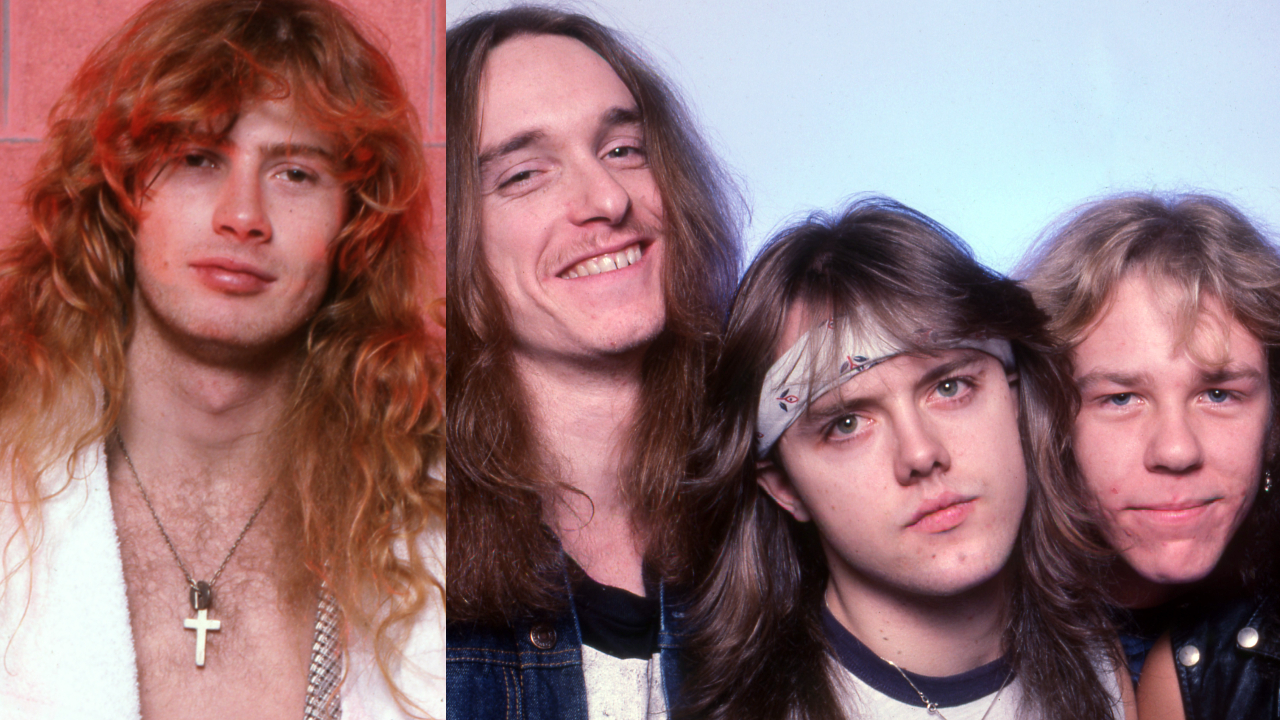“Even though Dave might claim that he wrote Leper Messiah, he didn’t”: The story of every song Dave Mustaine co-wrote for Metallica – and what Megadeth did with those riffs
From The Four Horsemen to The Call Of Ktulu, this is everything you need to know about the six (maybe seven) Metallica songs with Dave Mustaine’s name on them

‘Metallica vs Megadeth’ has been the metalhead’s ‘Blur vs Oasis’ for 40 years now, and it’s a rivalry built predominantly off of two things. One: the fact that Megadeth singer/guitarist Dave Mustaine was Metallica’s first lead guitarist from 1982 to 1983 before being unceremoniously fired. Two: that Metallica used songs that Mustaine co-wrote for them, despite the fact he allegedly asked them not to as he packed his bags.
The dispute over whose names belong on what song has sometimes got pretty ugly, to the point that Mustaine once blocked a reissue of the Metallica demo No Life Til Leather over apparently incorrect credits. The issue has heated up once again, as in October, Megadeth announced that their final album will feature bonus track Ride The Lightning: a Metallica song that Mustaine has had co-authorship of since 1984.
With the Megadeth swan song due out in January, we thought now would be an ideal time to put together your one-stop guide to all the Metallica songs that Mustaine co-wrote. From The Four Horsemen to The Call Of Ktulu, each track has its own story – including the varying things that Mustaine did with them once he formed Megadeth to get his revenge.

The Four Horsemen (Kill ’Em All, 1983)
Easily the most argued-over song of the bunch. It started life as The Mechanix: a speed metal scramble penned by Mustaine, with lyrics about sex at a gas station. Metallica fiddled with it a lot during the guitarist’s tenure, slowing it down and re-writing it to be about the four horsemen of the apocalypse. Before he was shown the door, purely out of spite, Mustaine added a mid-section jam that ripped off Sweet Home Alabama.
The Four Horsemen made it onto Metallica’s debut album Kill ’Em All, while Mustaine re-claimed The Mechanix with Megadeth, putting it on 1985’s Killing Is My Business… And Business Is Good!. Both tracks are setlist regulars for their respective bands, though Metallica have long since dropped the Sweet Home Alabama bit from their shows. Wise move.
Jump In The Fire (Kill ’Em All, 1983)
Jump… was another pre-Metallica composition from Mustaine. In fact, he says it’s the first thing he ever wrote. It became one of Metallica’s earliest recorded songs, appearing on their debut demo, which they tracked in ex-bassist Ron McGovney’s garage in 1982. Similar to The Four Horsemen, Mustaine originally wrote the lyrics about sex, before his bandmates changed them to be about Hell and demons.
The song became the fourth track and second single off of Kill ’Em All. Metallica have played it nearly 100 times, while Megadeth, unusually, haven’t done much with it. They jammed it a few gigs in 1984, but outside of that, Mustaine never re-recorded it or turned the riffs into something else.
Sign up below to get the latest from Metal Hammer, plus exclusive special offers, direct to your inbox!
Phantom Lord (Kill ’Em All, 1983)
According to Mustaine, Phantom Lord was a collaboration between himself and James Hetfield, even though Lars Ulrich also has a writing credit. The song’s named after the first band that Hetfield played in, and its lyrics are about the “deafening sound” of heavy metal music. Fellow Kill ’Em All tracks Whiplash and Hit The Lights have a similar theme.
Mustaine recycled the post-solo riff with Megadeth almost a decade down the line, using it for the outro of This Was My Life on the number-two-charting album Countdown To Extinction. In 2013, the band played Phantom Lord in its original form live, with ex-Metallica bassist Jason Newsted tackling lead vocals.
Metal Militia (Kill ’Em All, 1983)
Like Phantom Lord, Mustaine claims that Metal Militia was a joint effort between himself and Hetfield. He’s also alleged that Metallica lead guitarist Kirk Hammett gets royalties from the song – something that seems to piss him off, considering Hammett replaced him in 1983.
Metal Militia is the finale of Kill ’Em All and one of the fastest songs Metallica ever released, reaching 175 BPM. During the band’s early years, it closed their gigs, intended to end the night on a particularly brutal note. Mustaine wanted Megadeth to play Metal Militia live with Jason Newsted in 2013, but the plan was scrapped and they teamed up to do Phantom Lord on the same tour instead.
Ride The Lightning (Ride The Lightning, 1984)
Mustaine has a songwriting credit on two songs on Metallica’s second album, including the title track. According to him, Ulrich wrote the melodic introduction, while he contributed the first verse riff and the guitar part that starts after the second chorus.
Last month, Megadeth announced that their self-titled final album will feature a “reimagining” of Ride The Lightning as a bonus track. Mustaine told Hammer that the rendition was his way of bringing his career full circle. “This is a tip of a hat to him and to Metallica for everything that they’ve done, and everything that we’ve done. That legacy that really happened in that teeny little garage in Norwalk, California,” he said.
The Call Of Ktulu (Ride The Lightning, 1984)
The Call Of Ktulu is credited to Hetfield, Ulrich, Mustaine and classic Metallica bassist Cliff Burton. Mustaine’s riff is the backbone of the eight-minute instrumental, as he laid down the ominous arpeggio that the rest of the song builds itself off of. We know that that riff was his because he reused it 17 years down the line. Listen to the opening of When from Megadeth’s 2001 album, The World Needs A Hero, and the similarity is undeniable.
Leper Messiah (Master Of Puppets, 1986) (allegedly)
Ride The Lightning is the last Metallica album to give Mustaine a writing credit, but he says his fingerprints are on Master Of Puppets as well. Specifically, he’s alleged that Leper Messiah, the album’s grooving sixth song, features some of his material. Hammett has shot this claim down pretty frankly, though.
“Even though Dave might claim that he wrote Leper Messiah, he didn’t,” Hammett has said. “There’s maybe a chord progression that was in that song, like, maybe 10 seconds that came from him […] In fact, I remember being in the room when Lars came up with the main musical motif.”

Louder’s resident Gojira obsessive was still at uni when he joined the team in 2017. Since then, Matt’s become a regular in Metal Hammer and Prog, at his happiest when interviewing the most forward-thinking artists heavy music can muster. He’s got bylines in The Guardian, The Telegraph, The Independent, NME and many others, too. When he’s not writing, you’ll probably find him skydiving, scuba diving or coasteering.
You must confirm your public display name before commenting
Please logout and then login again, you will then be prompted to enter your display name.

